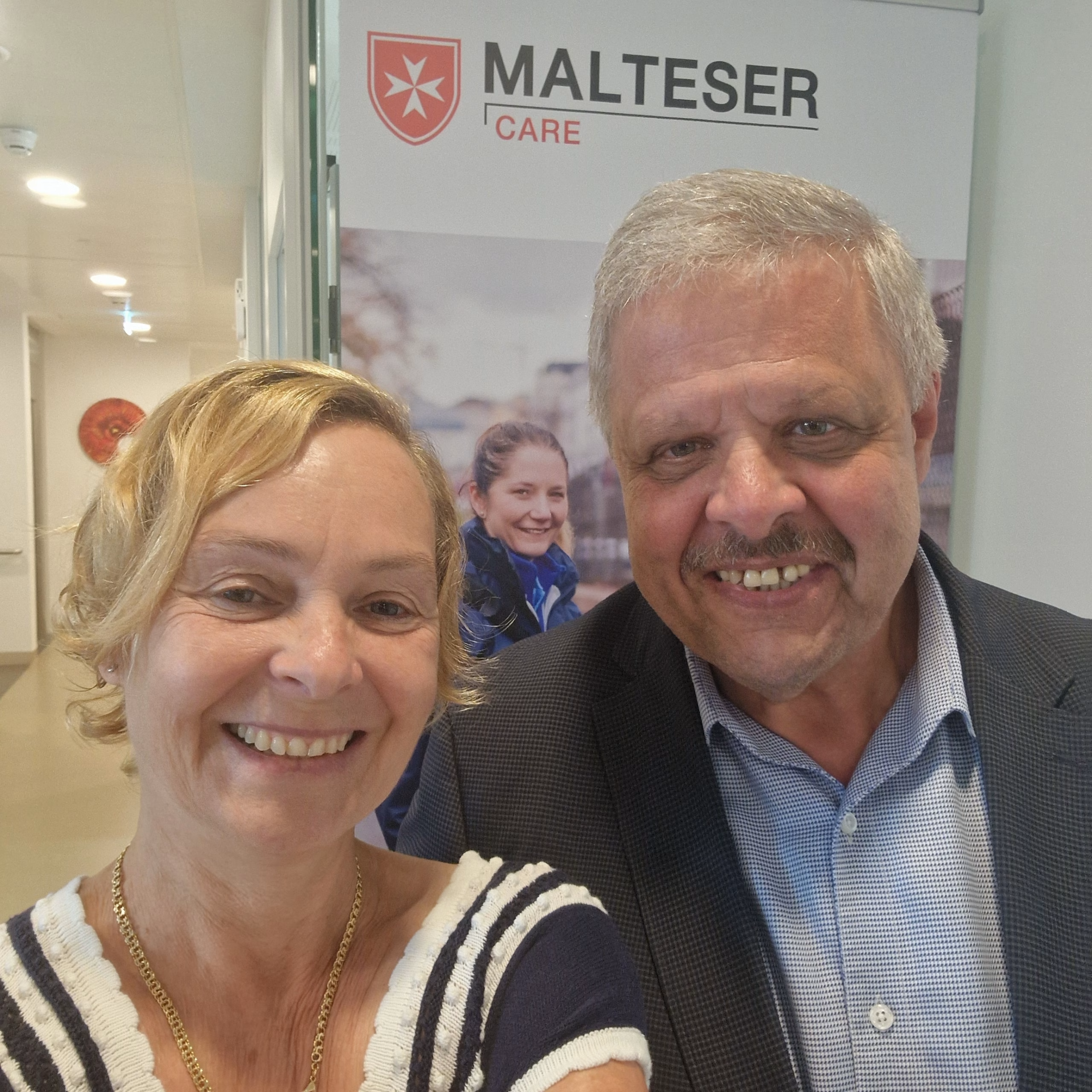Interview with Helmut Lutz, Managing Director of Malteser Care
The services offered by Malteser Care include
- Crisis accommodation for small children (0-3 years) with planned expansion.
- Family support for children with disabilities – including 24-hour care or hourly relief.
- Accompanying older people in their homes.
With around 140 employees, the team is small and manageable compared to other organizations, which enables flat hierarchies and short decision-making processes. This structure makes it possible to develop tailor-made solutions even for complex cases – something that funding bodies and partner organizations particularly appreciate.
One focus is on quality assurance:
- Own quality management system according to ISO standards.
- Participation in the voluntary ÖQZ certificate in the area of 24-hour care.
- Regular quality audits by the Vienna Social Fund.
We talk about values and the challenges of living them on a daily basis.
Overall, our cornerstones of cooperation, both internally and externally, are flexibility, humanity, quality and direct communication, which makes us a valued and innovative partner in Vienna’s social landscape.
Mr Lutz describes the organization as very diverse. “We support people at all stages of life – from newborns in crisis care to the very elderly in mobile care.” The focus is on individual care, with all services being provided exclusively for and with people.
We place particular emphasis on team structure, supervision and communication. We have mandatory supervision and attach great importance to regular team meetings. “Through personal leadership with proximity and the presence of the management, we support our employees and lay the foundation for a good bond and relationship with each other,” says Mr. Lutz.
We also try to strengthen the sense of togetherness through joint events (such as an Advent get-together) – even if not everyone can be there at the same time due to shift work.
A key management principle that I live by every day is genuine presence and openness. “It’s not just about having an open ear, but also seriously addressing concerns – not just listening, but also actively making something of them,” explains Mr. Lutz.
Many companies talk about an “open-door policy”, but don’t actually put it into practice. At Malteser Care, it is implemented authentically: “My office is actually open, which is understood by me and the team as a signal of accessibility and appreciation. If the door is closed as an exception, there is a clear reason for this, which is also communicated,” explains Mr. Lutz.
This practiced openness is perceived and appreciated by employees. There is a culture of respectful communication in which managers are not only approachable, but also act at eye level and with genuine attention. This attitude is very different from the superficial presence that is found in many other organizations.
On leadership, Mr. Lutz continues: “A central leadership principle is reliability, trust and support. We are a tightrope team in which no one “lets themselves off the rope” – especially not in difficult situations”, a clear image for Mr. Lutz. Leadership means communicating openly and honestly, looking for solutions to problems together – without interfering with the responsibilities of others or undermining managers. Decisions are made and communicated clearly and consistently across management lines.
Employee development plays a major role at Malteser Care. Our managers should recognize and support potential – be it through internal development or, if necessary, through appreciative support during career changes (outplacement). It is particularly valuable when former employees recommend the company to others – we see this as a sign of a successful corporate culture.
The success of this culture can be seen right now, for example, when we are in the process of creating a second crisis facility for young children: Despite staff shortages in the pedagogical area, recruiting is going well – through word of mouth and recommendations. Existing teams are open to change and help to integrate new staff – a clear advantage compared to a “greenfield” start.
A key concern of the entire management team is not to forget the people behind the performance. In many organizations, people often only look at plans and figures – we deliberately provide monthly feedback and communicate successes in an appreciative manner. This is not just about key figures, but above all about thanking and recognizing employees for their daily work.
Our thanks go not only to the teams, but also expressly to the family members of our employees. Whether care, child and youth welfare or mobile services – many activities are demanding, with long or irregular working hours. Without the understanding and support of families, this work would often not be possible.
After all, good work can only be done at work if things are “right” at home. This attitude shapes the culture – with the aim of living appreciation holistically, even beyond the organization.
When it comes to the topic of error culture, Mr. Lutz is particularly important:
We focus on an open and appreciative error culture that is based on trust and development. It is not about apportioning blame, but about jointly recognizing potential for improvement. Mr. Lutz describes error culture with the image of “treasure hunting instead of troubleshooting”. Mistakes are seen as an opportunity to optimize processes, not as a personal failure”.
An important component of this is our quality management system, which is used as a management tool to promote continuous improvement. The focus is always on people: at Malteser Care, criticism is always formulated objectively, never personally. Dignity and respect are central.
Mr. Lutz also emphasizes the importance of open communication – “even if something goes wrong. Anyone who admits a mistake is supported, not sanctioned.” We pay particular attention to the personal situation of employees, e.g. when private burdens affect their concentration. This creates a culture of trust in which further development and humanity go hand in hand.
How does Mr. Lutz act personally when he is under stress?
Mr. Lutz talks very openly about a health warning signal that prompted him to give up work, take better care of himself and set boundaries. He used to be very busy – 80 to 90-hour weeks were the norm. Through rehab and trusting his team, he was able to learn to hand over responsibility and take time off without feeling guilty.
He describes himself as an entrepreneurial pioneer who finds it difficult to let go – especially when new projects or challenges arise. Even though he is now good at delegating, he remains committed to innovative topics and problem-solving – a bit of a “backslider”, as he says.
A key concern for him is an orderly succession plan. This has already been communicated so that there is clarity for everyone as to how things will continue from the end of next year. The handover is taking place step by step – a planned transition into responsibility for his successors. Even though it is not an owner-managed company, the handover is seen as a business succession – with the aim of ensuring stability and continuity. “It gives me security, and this security is important to me,” Mr. Lutz concludes our conversation.





